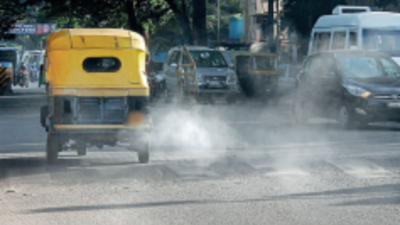Top Searches
- News
- City News
- bengaluru News
- Bengaluru's air quality dipped 8% in 2022, says survey
Bengaluru's air quality dipped 8% in 2022, says survey

Bengaluru's air quality dropped 8% in 2022 as compared to 2021, according to a recent survey by IQAir, a Swiss air quality technology company.
BENGALURU: As the city got back on its feet after the pandemic with offices reopening and businesses returning to normalcy, air pollution worsened last year.
Bengaluru's air quality dropped 8% in 2022 as compared to 2021, according to a recent survey by IQAir, a Swiss air quality technology company.
With an annual average of 31.5 g/m³ (micrograms per cubic metre of air) of particulate matter 2.5 for 2022, the city exceeded WHO's standard of 5g/m³ of PM 2.5, essential for maintaining healthy air quality, by over six times.
Looking at numbers from the past six years, the city's pollution levels of PM 2.5 seem to have been hovering between 32-34 g/m³, except during the peak Covid years that had people practising social distancing, avoiding public spaces and staying at home on most days. In 2022, after the last Covid lockdown, Bengaluru's air quality began to quickly deteriorate with PM 2.5 pollution levels reaching 45.1 g/m³ in March. The monsoon months of June, July and August brought some relief to the respiratory systems of many as the levels stood between 14-15 g/m³.
Karnataka State Pollution Control Board (KSPCB) drew up an action plan last year to combat air pollution levels which includes measures like scrapping old public buses, conducting emission tests for every vehicle, building water fountains and sprinkling treated water on dust-heavy roadsand creating green buffers between traffic corridors.
The IT capital, however, did not feature on the list of the world's 50 most-polluted cities; 70% of the listed cities were from India and India was ranked the 8th most-polluted country in the world.
Bengaluru's air quality dropped 8% in 2022 as compared to 2021, according to a recent survey by IQAir, a Swiss air quality technology company.
With an annual average of 31.5 g/m³ (micrograms per cubic metre of air) of particulate matter 2.5 for 2022, the city exceeded WHO's standard of 5g/m³ of PM 2.5, essential for maintaining healthy air quality, by over six times.
Looking at numbers from the past six years, the city's pollution levels of PM 2.5 seem to have been hovering between 32-34 g/m³, except during the peak Covid years that had people practising social distancing, avoiding public spaces and staying at home on most days. In 2022, after the last Covid lockdown, Bengaluru's air quality began to quickly deteriorate with PM 2.5 pollution levels reaching 45.1 g/m³ in March. The monsoon months of June, July and August brought some relief to the respiratory systems of many as the levels stood between 14-15 g/m³.
Karnataka State Pollution Control Board (KSPCB) drew up an action plan last year to combat air pollution levels which includes measures like scrapping old public buses, conducting emission tests for every vehicle, building water fountains and sprinkling treated water on dust-heavy roadsand creating green buffers between traffic corridors.
The IT capital, however, did not feature on the list of the world's 50 most-polluted cities; 70% of the listed cities were from India and India was ranked the 8th most-polluted country in the world.
Start a Conversation
FOLLOW US ON SOCIAL MEDIA
FacebookTwitterInstagramKOO APPYOUTUBE









